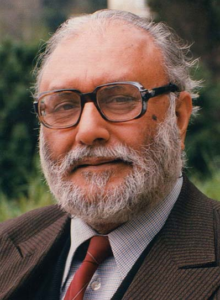
Abdus Salam was born on Jan 29, 1926 in middle class family living in Jhang Maghia, Punjab, India [now in Pakistan]. He was first Pakistani nuclear physicist who won nobel prize for their work in formulating the electroweak theory (Physics).
Family & Basic Education
His father Chaudhry Muhammad Hussein was a teacher and educational official in the Department of Education and his mother Bibi Hajira Hussien was a housewife. He had 6 brothers and 1 sister.
Salam had his early schooling in Jhang city. At the age of 12, Abdus Salam was admitted to Jhang’s local college in 1938 for his intermediate education. He spent four years because intermediate college starts from grade 9 til second year class. H scored record breaking marks in Punjab University’s matriculation entrance exams.
Higher Education
In 1942, Salam attended the Government College at Lahore. in 1943, he was sixteen years old when he published his first paper in Mathematics. He secured scholarship after getting high score in B.A. examination. In 1946, he managed to get a place in one of the boats that were full with British families who were leaving india. After two years he replaced the mathematics with physics and took its Part I and II together in 1949. After wining a number of prizes, Salam was ready to move back to Pakistan. In 1952 he received his Ph.D. in theoretical physics from the University of Cambridge.
Professional Career
In February 1953, anti-Ahmadiyya violence was started in many cities. Hundreds of Ahmadis were feared to be murdered. In 1954, Abdus Salam returned to St John’s College as a mathematics lecturer after riot was settled. Three years later in 1957, Salam accepted as a lecturer of applied mathematics at Imperial College, London. By next 1960, he was bestowed with the responsibility of chairing the Theoretical Physics department, along with Paul Matthews.
By next 1960, he was bestowed with the responsibility of chairing the Theoretical Physics department, along with Paul Matthews. Salam, Glashow, and Weinberg developed the theoretical basis for this unification, predicting elementary particles that were later confirmed. Salam was also a passionate promoter of science education in the developing world, founding the International Centre for Theoretical Physics (ICTP) in Trieste, Italy, in 1964. In 1970, Salam helped set up Pakistan’s first nuclear power plant in Karachi with the help of Canadian and Pakistani engineers.
Nobel Prize
He was awarded the Nobel Prize for Physics in 1979 with Sheldon Glashow and Steven Weinberg. They realized that weak nuclear forces and electromagnetic forces were components of the same force, termed the electroweak force. Weinberg and Glashow reached a similar conclusion using a different line of reasoning. The existence of the W and Z bosons was eventually verified in 1983 by researchers using particle accelerators at CERN (European research laboratory).
Some of his writings
- Islam and Science, Concordance or Conflict
- Future of science in Islamic countries (Paper for Islamic Summit, 1987)
- Poor As A Nation
Death
Abdus Salam died on 21 November 1996, at the age of 70 in Oxford, England. His body was returned to Pakistan and kept in Darul Ziafat. Approximately 30,000 people attended his funeral prayers. Salam was buried in Bahishti Maqbara, a cemetery established by the Ahmadiyya Community at Rabwah, Punjab, Pakistan, next to his parents’ graves.